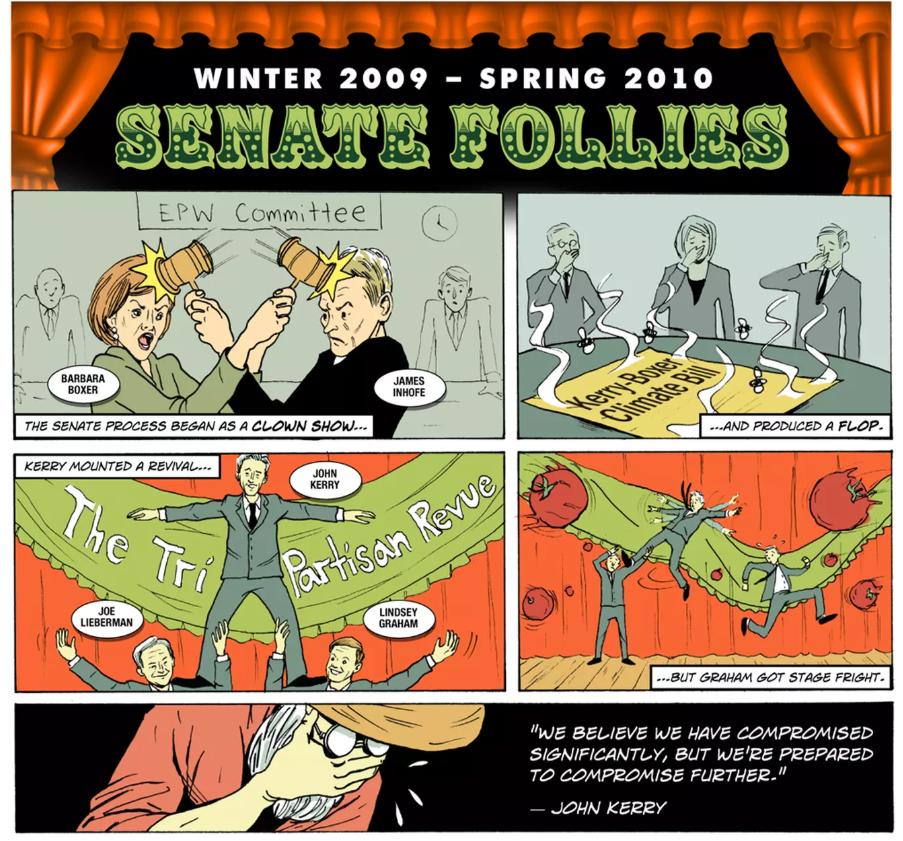Energy Lobbyists Have a New Political Action Committee to Push for a Carbon Tax. Wait, What?

June 24, 2018 - Former Sens. Trent Lott of Mississippi and John Breaux of Louisiana, longtime lobbyists and two of big oil’s most devoted servants, have formed a new political action committee. It is dedicated to the passage of a carbon tax.
Wait ... what?
Yes, it is true: The Political Action Committee (PAC) is called Americans for Carbon Dividends (AFCD) and it is educating the public about, and lobbying for, a policy called carbon tax-and-dividend. More specifically, it is pushing a proposal that was released last year by a nonprofit called the Climate Leadership Council (CLC), led by former Secretary of State James A. Baker III. AFCD is effectively the lobbying arm of the CLC.
The plan would impose a carbon tax starting at $40, “rising gradually” at an as-yet-unspecified rate, with all the revenue returned as per-capita dividends — rebates to individual citizens that the group estimates will start around $2,000 a year for a family of four.
AFCD’s CEO, the centrist author and speaker Ted Halstead, has helped bring on board a who’s who of Washington insiders. RTO Insider reports:
In addition to bringing on Hill+Knowlton to handle communications, Americans for Carbon Dividends has hired Squire Patton Boggs — where Lott and Breaux are senior counsels — as lobbyist and Margaret Lauderback, an ally of Rick Perry and House Majority Leader Kevin McCarthy, to lead fundraising. Political consultant Mark McKinnon, a former advisor to Sen. John McCain (R-Ariz.) and former President George W. Bush, and Joe Lockhart, White House press secretary under President Bill Clinton, have signed on as senior advisers. Former Bush aide Karen Hughes is of counsel.
Former Federal Reserve Chairs Janet Yellen and Ben Bernanke and former EPA Administrator Christine Todd Whitman, all founding members of the CLC, have also signed on to the new effort.
So far, funders include Exelon, the operator of America’s largest nuclear fleet, First Solar, and the American Wind Energy Association. Four big oil companies, Exxon Mobil, BP, Royal Dutch Shell, and Total SA supported the CLC proposal and are said to be mulling donations to AFCD.
You might think a coalition of Bush-era lobbyists and big energy corporations pushing a carbon tax would raise some suspicion, but reaction from the center-left establishment and the mainstream press has been positively glowing. But in the course of a somewhat credulous story on the subject, the New York Times’s John Schwartz quotes Yellen saying, “It’s something that may command bipartisan consensus.”
Similarly, Tom Kiernan, the CEO of the American Wind Energy Association (AWEA), told Greentech Media, “We see this as a valuable opportunity to join a bipartisan conversation on carbon policy.”
Ugh. Can we not?
This policy is not bipartisan in any meaningful sense, it is not likely to be political popular, it’s not all that great as policy to being with, and it is naive to see it as a gambit that arises primarily, or even tangentially, from environmental concerns. It is first and foremost a bid by oil and gas and nuclear to secure the gentlest and most predictable possible energy transition.
More broadly, it is the US Climate Action Partnership all over again. That was the effort, starting around 2006, to develop a climate bill that big, polluting industries would support. The idea was that support from such companies, combined with support from establishment green groups, would lend the effort credibility and political momentum. Instead, it yielded a compromised bill that no one loved, which died a lonely death in the Senate in 2010.

A cartoon about the Waxman-Markey bill’s life and ugly death.
Cartoon by David Roberts
The folks behind AFCD think they’re avoiding the big mistake of that episode: a policy too complicated to explain. And the tax-and-dividend idea is certainly simpler than cap-and-trade. But the biggest mistake of the 2008-era climate policy push was not the policy, it was the belief that corporate support is the key to climate policy.
Climate activists in 2006 couldn’t have understood the political situation into which their policy would be released, but there’s no such excuse today. The fact is that the political model ACCD represents — start in the Very Sensible Bipartisan Center and expand from there — hasn’t been fruitful for many years in the US. (Here’s great piece on that subject.) There’s certainly no reason to think it will work better any time soon.
CoalZoom.com - Your Foremost Source for Coal News

